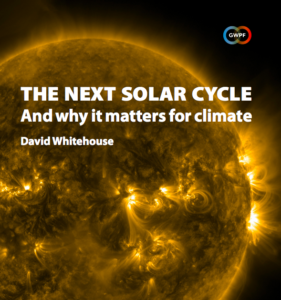by David Whitehouse.(pdf), April 6, 2020 in GWPF
London, 6 April: A former BBC science correspondent says that there remains a real possibility that unusual solar behaviour could influence the Earth’s climate, bringing cooler temperatures for the next decade.
Despite rising levels of atmospheric carbon dioxide, the reduction in solar activity along with cooling from other long-term terrestrial climate variables could mean we might see a slowdown in global warming for years.
Dr Whitehouse says: “It is clear that the solar influence on climate is about 0.1 °C a decade so it is important to know when there are low solar activity periods. We have a grasp of the basic mechanism that drives long-term solar activity, but many of the specifics still elude us. Successful predictions of solar cycle strength are therefore few and far between.”
Whitehouse adds that although NASA are predicting that solar cycle 25, which is just beginning, might be moderate-to-weak, the possibility of a very weak cycle, with a measurable effect on the terrestrial climate, remains a real one.
Dr Whitehouse reviews the history of solar cycle predictions in a new paper by the Global Warming Policy Foundation which is published today.
The paper, entitled The Next Solar Cycle, And Why It Matters For Climate, can be downloaded here (pdf).
Contact
Dr David Whitehouse
e: david.whitehouse@thegwpf.com

